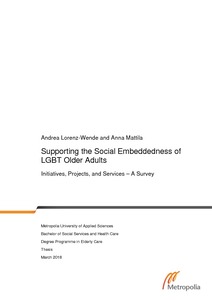Supporting the Social Embeddedness of LGBT Older Adults : Initiatives, Projects, and Services – A Survey
Lorenz-Wende, Andrea; Mattila, Anna (2018)
Lorenz-Wende, Andrea
Mattila, Anna
Metropolia Ammattikorkeakoulu
2018
All rights reserved
Julkaisun pysyvä osoite on
https://urn.fi/URN:NBN:fi:amk-201804134668
https://urn.fi/URN:NBN:fi:amk-201804134668
Tiivistelmä
As LGBT (lesbian, gay, bisexual, transgender) individuals age, they face a variety of challenges that their heterosexual peers do not. These challenges have an influence on their social inclusion and thus partly on their successful ageing. The main objective of this thesis was to analyse how different projects and initiatives are supporting the social inclusion of ageing LGBTs, in Europe and Finland. We hoped to gain insights about the various mechanisms and means of enhancing the social inclusion of LGBT older adults. This thesis was written in collaboration with the national human rights non-governmental organisation Seta – LGBTI Rights in Finland.
As for the methodology, based on the available data, a narrative literature review was chosen, and the research can be classified as a qualitative approach, building a narrative out of a heterogeneous data to a continuous event, also giving a historical background on the subject. Our research question and the chosen concepts (LGBT, Older Adults, Social Inclusion, Cultural Competence) defined the systematic search and use of our source material.
LGBT older adults often have the same concerns and questions about (present or future) care, support, and housing options as their heterosexual peers. Similarly, their expectations for services in old age have also much in common: recognising and supporting LGBT older adults’ own networks endorsing their social embeddedness, the wish for LGBT-specific initiatives in housing and care, and cultural competence in elderly services. Our study showed that interest in ageing LGBTs as well as their increasing need of various services is still quite limited, but nevertheless growing. The invisibility of LGBT older adults is decreasing, partly because the LGBT communities are becoming more vocal on matters related to elderly services, more local practical incentives are being implemented, and emphasis in culturally competent services has gained support.
Clearly, there have been positive developments regarding the inclusion of the ageing LGBT minority during the last decade or so, internationally and in Finland. However, LGBT advocacy organisations, groups, or community members should continue actively pursuing co-operation possibilities with mainstream elderly service providers, who have the resources to provide to the whole spectrum of our ageing population. Additionally, research about gender minorities is almost non-existent, and therefore shedding light on the life of ageing gender minorities would be extremely valuable and could possibly even help to create new practical initiatives. Discussions on diversity issues should be actively pursued. Without the knowledge of the realities in LGBT ageing, there can be no real understanding of the needs of this heterogeneous group of older adults.
As for the methodology, based on the available data, a narrative literature review was chosen, and the research can be classified as a qualitative approach, building a narrative out of a heterogeneous data to a continuous event, also giving a historical background on the subject. Our research question and the chosen concepts (LGBT, Older Adults, Social Inclusion, Cultural Competence) defined the systematic search and use of our source material.
LGBT older adults often have the same concerns and questions about (present or future) care, support, and housing options as their heterosexual peers. Similarly, their expectations for services in old age have also much in common: recognising and supporting LGBT older adults’ own networks endorsing their social embeddedness, the wish for LGBT-specific initiatives in housing and care, and cultural competence in elderly services. Our study showed that interest in ageing LGBTs as well as their increasing need of various services is still quite limited, but nevertheless growing. The invisibility of LGBT older adults is decreasing, partly because the LGBT communities are becoming more vocal on matters related to elderly services, more local practical incentives are being implemented, and emphasis in culturally competent services has gained support.
Clearly, there have been positive developments regarding the inclusion of the ageing LGBT minority during the last decade or so, internationally and in Finland. However, LGBT advocacy organisations, groups, or community members should continue actively pursuing co-operation possibilities with mainstream elderly service providers, who have the resources to provide to the whole spectrum of our ageing population. Additionally, research about gender minorities is almost non-existent, and therefore shedding light on the life of ageing gender minorities would be extremely valuable and could possibly even help to create new practical initiatives. Discussions on diversity issues should be actively pursued. Without the knowledge of the realities in LGBT ageing, there can be no real understanding of the needs of this heterogeneous group of older adults.
